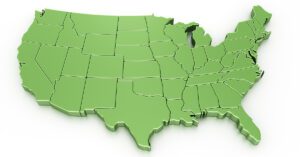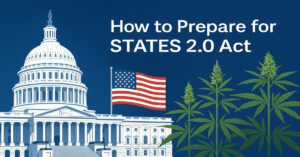Cannabis businesses face expensive issues at every turn before tax season, but now businesses are receiving massive tax bills due to an old IRS tax code that will not allow the business to make certain deductions.
Learn more in this article on the status of Section 280E and how California has passed Law AB37 to override the provision! You can also ask us your questions that we didn’t answer at the end.
What is Section 280E of the Internal Revenue Code ?
Section 280E of the Internal Revenue Code is a relatively straightforward statute; Section 280E denies deductions and credits on any amount incurred during the taxable year in carrying on a trade or business, if the trade or business consists of trafficking in controlled substances.
The section offers a limited exception for expenses characterized as cost of goods sold (“COGS”). Until recently, who cared? Section 280E was a method adopted by Congress to combat the days of lawless mobsters.
The rationale: If authorities cannot get you in trouble for your crimes, they are going to get you for tax evasion, instead. Okay, factually, that may not be how it happened, but really the application has been the same—no one used Section 280E. I guess no one back then imagined that cannabis would be legal.
Section 280E in Cannabis Taxes and Law AB37 in California
As the cannabis industry continues to grow exponentially, so does the case law surrounding Section 280E.

With each year, as these cannabis entities continue to file their taxes, they are confronted with the almost impenetrable wall that is Section 280E. While there have been creative ways to circumvent
this provision, one way or another, the tax courts have struck those ideas down.
On October 12, 2019, Governor Newsom signed into law AB 37, codified in Section 17209 of the California Revenue and Taxation Code. The bill overrides Section 280E through the following provision:
For each taxable year beginning on or after January 1, 2020, and before January 1, 2025, Section 280E of the Internal Revenue Code, relating to expenditures in connection with the illegal sale of drugs, shall not apply to the carrying on of any trade or business that is commercial cannabis activity by a licensee. – (CAL. REV. & TAX CODE § 17209 (2020). CAL. REV. & TAX CODE § 17209 (2020).
Commercial cannabis activity refers to those authorized by MAUCRSA under Section 26000 of the Business and Professions Code. The goal of the legislation is to provide tax equity to the cannabis industry and to align the Personal Income Tax Law with the Corporation Tax Law. Prior to AB 37, in California, certain entities, like LLC’s, were subject to Section 280E and were not able take itemized deductions, while Corporations were. The aim of the legislation was to correct this effect.
Of course, AB 37 only impacts state filings with the Franchise Tax Board and, for now, it is only available for the next five years.
While a win nonetheless, AB 37 has no impact on federal tax filings which is where a majority of cannabis entities pay their income taxes with effective tax rates as high as 70%. But, maybe there is some hope for those challenging Section 280E on the federal level.
Tax Court Hearing Challenges from Businesses
On October 23, 2019, the tax court heard another case out of California where a medical marijuana dispensary challenged the provision on Eighth Amendment grounds. The entity argued that Section 280E was not a tax provision at all, rather it amounted to excessive fines which is prohibited under the Eighth Amendment.
The court struck down this argument stating that Section 280E is not a penalty provision. The court went on to discuss that Section 280E could not have been drafted more clearly. It denies ordinary and necessary business deductions for those operating federally illegal businesses. The court was adamant about not limiting this scope.
Is Section 280E a Violation of Sixteenth Amendment?
The most interesting argument, however, was made by one of the dissenting judges who argued that Section 280E potentially violates the Sixteenth Amendment.
Judge Gustafson argued that the Sixteenth Amendment gives Congress the power to collect taxes on income, from whatever source derived, but by disallowing deductions on the income, Section 280E fabricates a gain.
For example: If one spends $600 (materials, labor, and rent) to produce goods and sells $500 worth of the goods, that person is allowed to register a loss as it can deduct the cost of materials, labor, and other expenses. But for cannabis businesses, those same numbers will register a gain. A cannabis business cannot take deductions for their business expenses. Therefore, $500 worth of goods subtracted by $400 (the cost of materials) registers a $100 gain under the example above.
Judge Gustafson argued that the Sixteenth Amendment permits Congress to tax incomes which are gains realized on a transaction. Section 280E’s disallowances of all deductions turns the income tax on an amount greater than a taxpayer’s “income” within the meaning of the Sixteenth Amendment.
Will Section 280E Tax Law Be Changed?
It is uncertain what round of constitutional challenges to Section 280E will be brought forth next, but a Sixteenth Amendment challenge might be worth exploring. Until cannabis becomes federally legal, businesses will continue to experience a purgatory between the traditional underground cannabis market and the legal market creating structure.
Cannabis Business Support for Formation and Capitalization
If you are interested in forming a cannabis business and are curious about entity formation and capitalization, please contact Larry Horwitz at Horwitz + Armstong.





